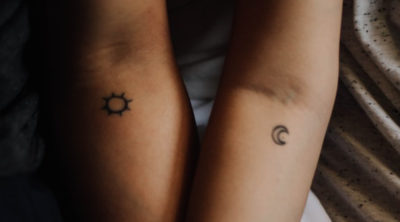
Can tattoos cause blood poisoning? Scroll down to find out more on the circumstances under which one may develop an infection in blood after getting a tattoo.
Tattoos and piercings are the most common forms of body art that are an absolute rage amongst the young crowd. Getting an intricate design inked or tattooed on your body, or having piercings on your body, can surely make you look cool, however, there is a great need to ensure that you follow the aftercare measures religiously. However beautiful a tattoo may appear, one cannot ignore the fact that tattoo is basically a type of a puncture wound. Once the person decides on the tattoo design he/she wants, the tattoo artist uses a sterilized needle that penetrates through the epidermis (outermost layer of the skin), thereby injecting ink into the dermis (layer of the skin that lies beneath the epidermis) to etch the tattoo design on the body.
While puncturing of the skin would give rise to pain, the intensity of pain one may experience would vary depending on one’s pain threshold. Serious health risks are associated with the use of unsterilized tattoo equipment, which is why, one must ensure that the tattoo artist follows all the necessary precautionary measures. Those who don’t follow tattoo aftercare tips may also end up with an infected tattoo. Can an infected tattoo pose serious health risks? Can tattoos cause blood poisoning? Scroll down to find out more on whether infected tattoos can cause blood poisoning.
Tattoos and Blood Poisoning
Before we move on to the symptoms of an infected tattoo, let’s first understand what blood poisoning means. Well, the term ‘blood poisoning’ is not really a medical term. It is basically used to signify a bacterial blood infection. In medical terminology, a severe infection that may be caused due bacteremia (presence of bacteria in blood) is referred to as ‘sepsis’ or ‘septicemia’. So, how do bacteria enter the bloodstream? Well, some strains of bacteria are normally present on the human body, however, these may not cause any harm until they get a chance to enter through cuts or breaks in the skin. This is the reason why wounds must not be left uncovered.
So, can tattoos really cause blood poisoning? Since the skin barrier is no longer intact after one gets a tattoo etched on the body, a person who has recently got a tattoo etched on the body, is certainly at a risk of developing an infection. Bacteria can easily enter into the body by traveling through the breaks in the skin.
Bacteria may cause superficial skin infections that manifest in the form of inflammation of the epidermis, and at times, the deeper layers of the skin may also be involved. Sepsis or blood poisoning, on the other hand, is a systemic condition, wherein pathogens travel via blood and go on to infect the vital organs of the human body. Those who seek the services of professional tattoo artists, and also follow the aftercare instructions are less likely to suffer from such pathogenic skin infections or sepsis.
Blood poisoning can easily be averted if one seeks medical help on noticing the early signs of a tattoo infection. While it is normal to experience pain, slight redness and mild swelling after getting a tattoo, the symptoms usually subside after a while. If symptoms such as pain, swelling, pus, greenish discharge, fever, muscle ache or red streaks around the tattoo persist, seek medical assistance at the earliest.
How to Prevent Blood Poisoning from Tattoos
Use of contaminated needles can increase the risk of infections such as hepatitis C or AIDS, which is why, one must look for a licensed tattoo artist. The incidence of bacterial blood infection would automatically be lowered when sterilized equipment is used. Once the tattoo has been etched on your body, tattoo artist would apply a bandage on the tattooed area to prevent an infection. Make sure that you keep the bandage for the period of time suggested by the tattoo artist. The tattooed area must be cleaned with an antiseptic solution and dried with a soft clean cloth.
One must refrain from touching the tattoo with dirty hands. It would be best to wear clothes made from soft fabrics so that the skin is not damaged due to friction from coarse fabrics. As the skin heals, it may start peeling. It is extremely important to let the dead skin fall off on its own. One must never pull off the dead skin. Frequent wetting off the skin can cause problems, which is why one must not go for a swim or spa treatments until the skin has healed completely. Exposure to sun must be avoided as well. Application of medicated moisturizing creams or antibiotic ointments would certainly help in preventing bacterial skin infections.
Though superficial skin infections may affect those who don’t follow tattoo aftercare measures, systemic blood infection could occur if an infected tattoo is left untreated. Blood poisoning needs extensive treatment and could turn into a life-threatening situation if not medically attended to. While antibiotic therapy is an important part of the treatment, oxygen therapy or intravenous administration of fluids may be required in severe cases. Since the use of unsterilized tattoo needle may put one at an increased risk of developing an infection, tattoo enthusiasts must seek the services of a licensed tattoo artist and follow all the recommended aftercare measures.


